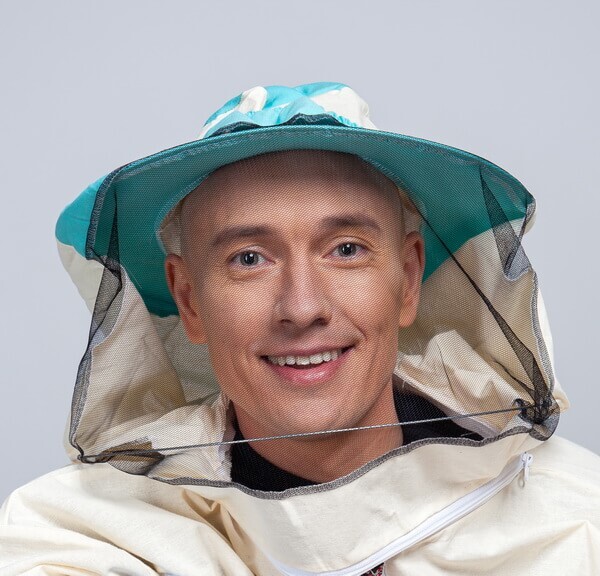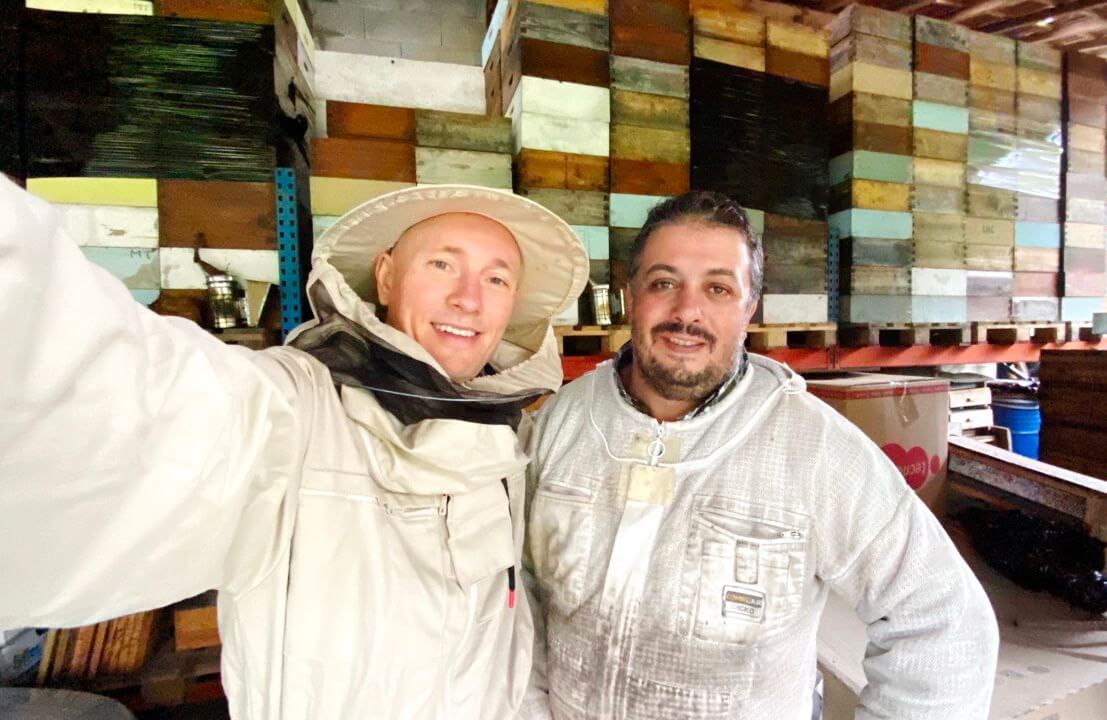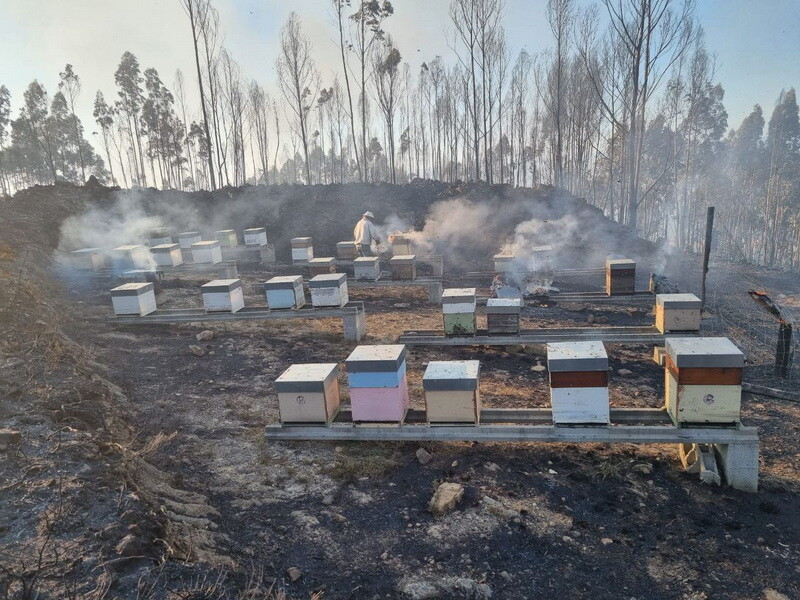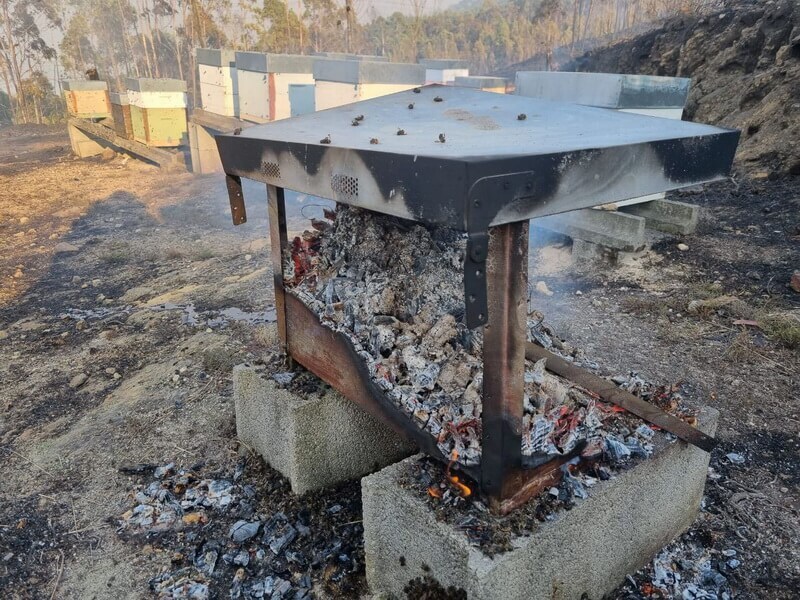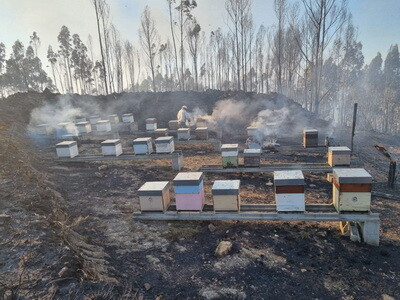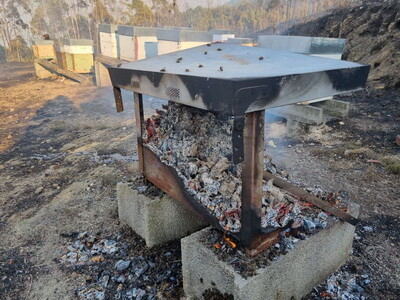Language
PORTUGAL HONEYNATURAL AND
LOVE-HARVESTED
Northern Portugal honey from the nectars of wild lavender, heather, eucalyptus and chestnut. For true lovers of a natural bee products with outstanding quality.
Beekeeping in Portugal 🐝
Portugal is a unique country in the very West of Europe, stretching on the Iberian Peninsula along the Atlantic coast. High rainfall, the presence of mountains and wild honey plants have created excellent conditions for the development of beekeeping. The Mediterranean climate with mild wet winters has allowed Australian eucalypts to take hold here and occupy significant areas. On the coast the climate is milder (winters are warmer, and summers are not so hot), and inland the differences become more pronounced. That is why in the zone up to 40-50 km from the ocean, the eucalyptus blooms in winter, releasing nectar (from December to February), and inland to the border with Spain this does not happen, because here the night temperatures are much lower. Even if the eucalyptus blooms there, it does not release nectar and the bees are not active in winter.
The local bees are the iberian race. Very willful and it is preferable not to approach them without proper equipment. The first time I went to an apiary in Portugal, I didn't wear gloves out of habit. Local beekeepers looked surprised. The severely bitten hands made me change that habit - now before going to the local bees, I also put on gloves. The peculiar character of local bees, I think, is due to the unpredictable climate, especially in winter. Whether it is so or not, the fact remains and should be taken into account.
We will talk about the honey produced by these Iberian bees in the North of Portugal a little further on.
PORTUGAL HONEYNATURAL AND
LOVE-HARVESTED
Northern Portugal honey from the nectars of wild lavender, heather, eucalyptus and chestnut. For true lovers of a natural bee products with outstanding quality.
Beekeeping in Portugal 🐝
Portugal is a unique country in the very West of Europe, stretching on the Iberian Peninsula along the Atlantic coast. High rainfall, the presence of mountains and wild honey plants have created excellent conditions for the development of beekeeping. The Mediterranean climate with mild wet winters has allowed Australian eucalypts to take hold here and occupy significant areas. On the coast the climate is milder (winters are warmer, and summers are not so hot), and inland the differences become more pronounced. That is why in the zone up to 40-50 km from the ocean, the eucalyptus blooms in winter, releasing nectar (from December to February), and inland to the border with Spain this does not happen, because here the night temperatures are much lower. Even if the eucalyptus blooms there, it does not release nectar and the bees are not active in winter.
The local bees are the iberian race. Very willful and it is preferable not to approach them without proper equipment. The first time I went to an apiary in Portugal, I didn't wear gloves out of habit. Local beekeepers looked surprised. The severely bitten hands made me change that habit - now before going to the local bees, I also put on gloves. The peculiar character of local bees, I think, is due to the unpredictable climate, especially in winter. Whether it is so or not, the fact remains and should be taken into account.
We will talk about the honey produced by these Iberian bees in the North of Portugal a little further on.
Hello, dear visitor of the site!
My name is Artur. I am the founder of API-SON - Bee Sleep. Before being interested in bees I had a different life. I am a certified deep sea captain, I traveled all over the world, visiting about 60 countries. From the moment I discovered Sleeping on the Hives, I forgot about the sea and completely immersed myself in the wonderful world of bees.
I have been familiar with bees since my early childhood. My father had a small bee farm, but as a child I was not interested in bees. When I became an adult, in between jobs, I started my own small bee farm, which gave me and my family honey and bee products.
I have been beekeeping since 2010 and I love these little striped workers (bees) with all my heart. My book that I wrote is called "The Amazing World of Bees", where I describe these lovely creatures, as well as the benefits of bee products that I discovered, including honey. Living in Odessa I had 2 bee farms: one for bee products and the other for Sleeping on Hives. Therefore, I always had honey from my beehives on the table.
On February 24, 2022, all that changed. When choosing a country, the development of beekeeping played an important role. Finding myself in Portugal, of course, I began to look for natural honey. Most of the honey that is sold in supermarkets is heat treated (loses its useful properties), becoming always liquid (doesn't crystallize). When I started looking for local beekeepers, I met Bruno.
Meet Bruno, the most famous beekeeper in Portugal!
If not in the whole of Portugal, then in the Northern part of it for sure! Bruno's beekeeping students come from all over the country to learn the art of beekeeping from him.
Bruno and I have a similar story: we started beekeeping as a hobby, on the farms of our wives' parents, and then we fell in love with bees so much that we became involved in it seriously. Bruno originally wanted to increase almond production on the farms of his parents-in-law. Today Bruno is the president of the Association of Beekeepers of Northern Portugal and has a large number of bee colonies in the northern part of the country (about 700 hives). Since for both me and him bees were not originally for profit (he has his own Electrification company), we were able to love bees with all our souls. Probably because of our love for bees, we immediately found a connection and, most importantly, we always have something to talk about. After several visits to Bruno's bee farm, having taken part in the honey production, I can say with certainty that this is really honey harvested with love:
Hello, dear visitor of the site!
My name is Artur. I am the founder of API-SON - Bee Sleep. Before being interested in bees I had a different life. I am a certified deep sea captain, I traveled all over the world, visiting about 60 countries. From the moment I discovered Sleeping on the Hives, I forgot about the sea and completely immersed myself in the wonderful world of bees.
I have been familiar with bees since my early childhood. My father had a small bee farm, but as a child I was not interested in bees. When I became an adult, in between jobs, I started my own small bee farm, which gave me and my family honey and bee products.
I have been beekeeping since 2010 and I love these little striped workers (bees) with all my heart. My book that I wrote is called "The Amazing World of Bees", where I describe these lovely creatures, as well as the benefits of bee products that I discovered, including honey. Living in Odessa I had 2 bee farms: one for bee products and the other for Sleeping on Hives. Therefore, I always had honey from my beehives on the table.
On February 24, 2022, all that changed. When choosing a country, the development of beekeeping played an important role. Finding myself in Portugal, of course, I began to look for natural honey. Most of the honey that is sold in supermarkets is heat treated (loses its useful properties), becoming always liquid (doesn't crystallize). When I started looking for local beekeepers, I met Bruno.
Meet Bruno, the most famous beekeeper in Portugal!
If not in the whole of Portugal, then in the Northern part of it for sure! Bruno's beekeeping students come from all over the country to learn the art of beekeeping from him.
Bruno and I have a similar story: we started beekeeping as a hobby, on the farms of our wives' parents, and then we fell in love with bees so much that we became involved in it seriously. Bruno originally wanted to increase almond production on the farms of his parents-in-law. Today Bruno is the president of the Association of Beekeepers of Northern Portugal and has a large number of bee colonies in the northern part of the country (about 700 hives). Since for both me and him bees were not originally for profit (he has his own Electrification company), we were able to love bees with all our souls. Probably because of our love for bees, we immediately found a connection and, most importantly, we always have something to talk about. After several visits to Bruno's bee farm, having taken part in the honey production, I can say with certainty that this is really honey harvested with love:
Better to see once than to hear 10 times ;)
I propose to immerse in that atmosphere of love and watch the video of honey harvesting at Bruno's bee farm:

The bee farm is located in the beautiful countryside called Lamelas, 25 km NE of Porto. In this beautiful area lies Bruno's main bee farm. His other hives are scattered all over Northern Portugal. You wouldn't normally see such a large number of people at the bee farm as in the video, but the video was taken during a practical session when Bruno's students came to the bee farm.
Пасека 700 пчелосемей!
When Bruno told me the number of bee colonies in his bee farms, I was really surprised. All my beekeepers friends in Ukraine had bee farms of 50-200 bee-hives. I have never been familiar how to work on industrial bee farms, but actully I was not really interested in it, because I was engaged in eco-beekeeping.
Bee robberies are quite rare in Portugal and so the bees are on their own.All of Bruno's bee farms are located in different locations with 70-80 hives on each of them. As a rule, these are some inaccessible areas near forests. Bee robberies are quite rare in Portugal and so the bees are on their own.
Bruno, like me, has come to the conclusion that the less the bees are disturbed the better, and the more honey they produce. This approach results in production of truly natural honey.
Forest fires are a danger to bees and beekeepers in Portugal. Last year Bruno's nearly lost an entire bee farm location due to a fire. Preventive measures were taken and only a few hives were lost.

Better to see once than to hear 10 times ;)
I propose to immerse in that atmosphere of love and watch the video of honey harvesting at Bruno's bee farm:
The bee farm is located in the beautiful countryside called Lamelas, 25 km NE of Porto. In this beautiful area lies Bruno's main bee farm. His other hives are scattered all over Northern Portugal. You wouldn't normally see such a large number of people at the bee farm as in the video, but the video was taken during a practical session when Bruno's students came to the bee farm.
Пасека 700 пчелосемей!
When Bruno told me the number of bee colonies in his bee farms, I was really surprised. All my beekeepers friends in Ukraine had bee farms of 50-200 bee-hives. I have never been familiar how to work on industrial bee farms, but actully I was not really interested in it, because I was engaged in eco-beekeeping.
Bee robberies are quite rare in Portugal and so the bees are on their own.All of Bruno's bee farms are located in different locations with 70-80 hives on each of them. As a rule, these are some inaccessible areas near forests. Bee robberies are quite rare in Portugal and so the bees are on their own.
Bruno, like me, has come to the conclusion that the less the bees are disturbed the better, and the more honey they produce. This approach results in production of truly natural honey.
Forest fires are a danger to bees and beekeepers in Portugal. Last year Bruno's nearly lost an entire bee farm location due to a fire. Preventive measures were taken and only a few hives were lost.
The main benefits of honey from Northern Portugal 🍯
Wild plant nectar
The vast majority of plants that are pollinated by local bees are wild plants such as wild lavender, heather, chestnut, and eucalyptus;
No extra "chemicals"
Since these are all plants that are not cultivated by humans (unlike sunflower, rapeseed, buckwheat in Ukraine), they are not treated with chemicals (pesticides and herbicides);
Natural and useful
As a result, local bee products of Portugal are more natural and organic with far less unnecessary chemicals.
However, Portuguese beekeepers have their own reasons to worry!
One of them is forest fires. Though eucalyptus trees produce nectar and, on one hand, are good for honey production in winter, on the other hand, they are very vulnerable to fires in summer. Eucalypts were brought to Portugal in the late 19th century from Australia and have adapted so well to the local conditions that they have almost completely replaced the native broadleaved and pine forests growing here.
Eucalyptus has a very pleasant aroma due to the fact that its leaves contain essential oils and tannins, and its bark is easily ignited, leading to frequent fires. Unlike the indigenous plants of Portugal (pine and cork oak), the leaves and bark of eucalyptus are much more flammable, with strips of bark hanging from the trunks and being blown around by the wind, spreading the flames very quickly over large areas.
A last year fire, almost destroyed an entire location, one of Bruno's bee farms (about 80 hives)!
Thanks to timely taken action, only a few hives were lost.
It is very painful to watch burning up living creatures, your beloved pets that bring so much good. I know this because I had that experience myself, when the war started, all my api-houses with bees inside were burned down. So I understand perfectly well what a beekeeper feels when his babies are burned. However, Bruno continues to develop, making tremendous efforts to protect his bees from fires, Asian hornets and Varroa mites. And in doing so, he produces healthy bee products, an assortment of which you can find below 👇.
Place your order and support this truly challenging work of crafting quality honey and other bee products, harvested with a special love to bees and nature:
However, Portuguese beekeepers have their own reasons to worry!
One of them is forest fires. Though eucalyptus trees produce nectar and, on one hand, are good for honey production in winter, on the other hand, they are very vulnerable to fires in summer. Eucalypts were brought to Portugal in the late 19th century from Australia and have adapted so well to the local conditions that they have almost completely replaced the native broadleaved and pine forests growing here.
Eucalyptus has a very pleasant aroma due to the fact that its leaves contain essential oils and tannins, and its bark is easily ignited, leading to frequent fires. Unlike the indigenous plants of Portugal (pine and cork oak), the leaves and bark of eucalyptus are much more flammable, with strips of bark hanging from the trunks and being blown around by the wind, spreading the flames very quickly over large areas.
A last year fire, almost destroyed an entire location, one of Bruno's bee farms (about 80 hives)!
Thanks to timely taken action, only a few hives were lost.
It is very painful to watch burning up living creatures, your beloved pets that bring so much good. I know this because I had that experience myself, when the war started, all my api-houses with bees inside were burned down. So I understand perfectly well what a beekeeper feels when his babies are burned. However, Bruno continues to develop, making tremendous efforts to protect his bees from fires, Asian hornets and Varroa mites. And in doing so, he produces healthy bee products, an assortment of which you can find below 👇.
Place your order and support this truly challenging work of crafting quality honey and other bee products, harvested with a special love to bees and nature:
Online shop for bee products produced by Bruno's:
Друзья, вы часто спрашиваете у меня маточное молочко. К сожалению, поскольку я занимаюсь естественным пчеловодством, то маточное молочко не произвожу. Однако, у меня есть друзья, которые также как и я любят пчёл, но занимаются промышленным пчеловодством и у них есть этот чудо-продукт.
Лиофолизированное маточное молочко 10 капсул - 220 грн.
1 упаковка содержит 10 капсул по 0,35 г, что соответствует 1 г нативного маточного молочка.
Употребление:
Курс приема для взрослых:
по 1-2 капсулы в день за 30 мин. до еды, содержимое капсулы хорошо рассасывать во рту, не запивать водой. Курс 21- 30 дней.
Детям дозу снижают в 2 раза.
ЗАКАЗАТЬ
FAQ
(perhaps someone has already asked your question below):
What difference between Bruno's honey and that sold in supermarkets?
Most of the honey sold in supermarkets is pasteurized (heated). Because of this, honey loses most of its healthy properties and becomes just a sweet substance. Therefore, it is not advisable to heat honey above 40 degrees. If you are used to putting honey in hot tea, it is better not to do this, and eat with a spoon, while drinking tea. In some sources you can even find that when heated, honey turns into poison. When heated, it is true that oxymethylforfurol is formed in honey, but its concentration is ten times less than in a regular cup of coffee. So it is a myth that heated honey becomes dangerous to health, it just does not have all the useful properties of natural honey. Bruno honey is not subjected to heat treatment and contains all the beneficial properties of natural honey.
How do I order?
On the online shop, you choose the product you want, specify the quantity and place an order. The shopping cart automatically calculates the total amount. In the application form it is better to indicate your WhatsApp number in order not to bother you with phone calls and to discuss the order in chat.
After placing the order, we will contact you, clarify the details and start preparation of your order.
Your order will be packed and will be waiting for you at the Beekeepers Association (Rua Damião de Gois, 93 – 1º 4450-225 PORTO). You will not have to wait, just come at a convenient time, pick up your order and enjoy the excellent quality of natural bee products.
How do I pay my order?
Payment can be made when you pick up your order at the Beekeepers Association.
What time can I pick up my order?
The Beekeepers Association is open every working day (Monday - Friday) from 14:00 to 18:00. At this time your order will be waiting for you. See you soon!
How do you get to us?
Rua Damião de Gois, 93 – 1º 4450-225 PORTO
at this address go up one level to the 1st floor ( the passage on the right side of the cafe). Association of Beekeepers of Northern Portugal (Associação dos Apicultores do Norte de Portugal)
How do you reach us?
Rua Damião de Gois, 93 – 1º 4450-225 PORTO
at this address go up one level to the 1st floor ( the passage on the right side of the cafe). Association of Beekeepers of Northern Portugal (Associação dos Apicultores do Norte de Portugal)
Reviews from beloved clients
I recently had a respiratory infection and was coughing for several weeks. I tried the propolis tincture and within two days the cough was completely gone. I highly recommend it!!!!
Thank you so much! Really enjoyed Bruno's natural honey and pollen. Although I am Portuguese, before I met Arthur, I was not familiar with the local beekeepers and did not know where to buy natural honey. Now I know where in Porto I can buy natural bee products directly from the producer. Thank you 😊
Artur, thank you for your work!
Incredibly delicious honey with lavender and eucalyptus, the jar is already running out!
Thank you for the quick processing of my order!
I owe my health to you and your friend! You are a very bright person, good luck to you and your business!
In addition to honey from Portugal, you can also order my creamed honey from Ukraine of 7 tastes with dried berries, fruits, herbs and nuts at this link. Or just click the photo below:
Где мы находимся?
Одесская область, Великомихайловский район, хутор Орёл
OUR ADDRESS:
+351 91 331 66 88 (whatsapp, telegram)
api-son@medok.od.ua
OUR ADDRESS:
+351 91 331 66 88 (whatsapp, telegram)
api-son@medok.od.ua
LIGAR-SE EM REDES SOCIAIS:
Your Cart
Your Order
Your cart is empty
Политика конфиденциальности
Редактируемый текст
Данный сайт использует Cookie
Редактируемый текст
